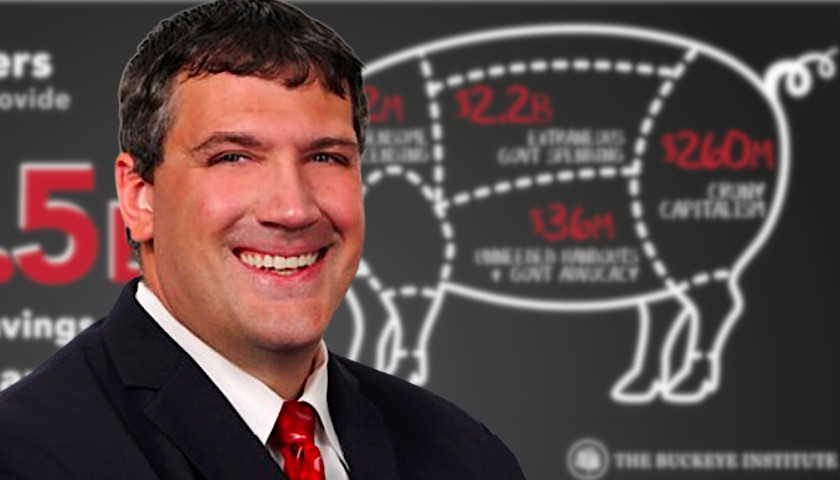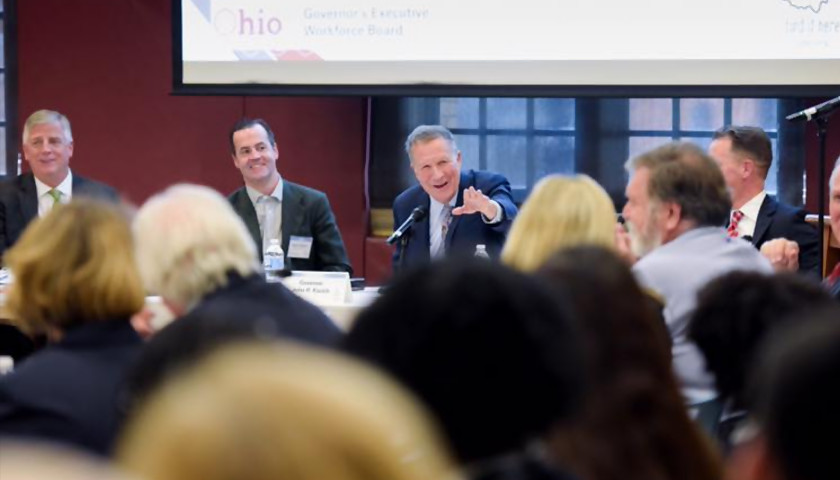Governor Mike DeWine’s proposed budget for Ohio includes a provision that will raise taxes and regulations on all tattoo artists and body piercers throughout the state. The new provision would require that all current and future tattoo artists and body piercers register with the state for as long as they are operating in that capacity. In addition, they would also have to pay a “registration fee” of $250. Furthermore, the provision would also call for a comprehensive overhaul of the current tattoo and body piercing training standards. This would cover anyone whose profession is defined as a “body artists” There is currently a medley of rules, regulations, and fees associated with being a tattoo artist in the Buckeye State. Some of the most extensive concern the cleanliness of needles and the heating devices that sterilize them, including that they: Ensure that weekly tests of the business’s heat sterilization devices are performed to determine whether the devices are functioning properly. In having the devices tested, the operator of the business shall use a biological monitoring system that indicates whether the devices are killing microorganisms….The operator shall maintain documentation that the weekly tests are being performed. To comply with the documentation requirement, the…
Read the full storyTag: Buckeye Institute
Buckeye Institute Annual Report Identifies $2.5 Billion in Savings for Ohio Taxpayers
The Buckeye Institute released its annual Piglet Booklet Wednesday, which identifies wasteful government spending across state agencies that could save Ohio taxpayers $2.5 billion. “In this year’s Piglet Booklet, The Buckeye Institute identified at least $2.5 billion that policymakers can save Ohioans. And with the increase in the gas tax, it is critical to cut spending and taxes to relieve the growing burden on Ohio families,” said Greg Lawson, research fellow at The Buckeye Institute and author of the report. “Making these cuts will save Ohio taxpayers money, make government more efficient and effective, and keep the state on solid financial ground to better weather the next economic storm,” Lawson continued. The Piglet Booklet identifies four key areas where government spending and oversight can be reduced, including corporate welfare programs, government philanthropy and advocacy, burdensome occupational licensing regimes, and earmarks in spending bills. “Governments should not engage in crony capitalism by supporting one private company over another—it is ethically inappropriate and economically harmful,” the report says of the corporate welfare category. It identifies eight different “corporate welfare programs that should be eliminated,” such as the $3.1 million that is used to conduct “marketing on behalf of the state’s wine grape…
Read the full storyDeWine Breaks from Republicans on Gas Tax
COLUMBUS, Ohio–In Tuesday’s State of the State Address, Ohio Republican Governor Mike DeWine made it very clear he would not back down on the 18 cent gas tax, leaving many state Republicans in a complicated position. In his Address, DeWine made it clear that, not only was the gas tax absolutely necessary but that an 18 cent per gallon increase (generating an additional $1.2 billion per year) was also the bare minimum necessary to address the needs of the state. “Our local jurisdictions and the state have a combined shortfall this year and for years into the future of at least $1.2 billion dollars per year. It will take this much additional revenue just for us to maintain our roads in their current condition and do only a modest amount of new work,” DeWine said. “Members of the General Assembly, by requesting $1.2 billion dollars to fill the budget hole and meet existing needs, let me assure you that I am taking a minimalist, conservative approach, with this being the absolute bare minimum we need to protect our families and our economy.” Despite his assertion that this is as low as the hike can be, a senior legislator from his…
Read the full storyDeWine Appointed Committee Recommends Gas Tax Hike for Ohio
After two meetings and two hours of public testimony, the Governor’s Advisory Committee on Transportation has, so far, agreed on only one thing to save Ohio’s roads and bridges: raise taxes. As previously reported, the committee was officially launched on January 31st. Hand-picked by Governor Mike DeWine, the bipartisan committee of industry leaders, advisers, and infrastructure experts was assigned the review the current infrastructure needs and explore creative and unique solutions. While they have yet to make their final report, these initial findings are sure to disappoint many of DeWine’s voters, should they be adopted. The current gas tax was set at 28-cents-a-gallon on July 1st, 2005. These revenues are intended to directly fund the maintenance, repair, and expansion of roads and bridges throughout the state. Over time, two primary factors have greatly diminished their ability to do so. The first is that, as cars have become more efficient and achieve higher miles-per-gallon, revenues have decreased. In addition, the higher demand and proliferation of electric vehicles has had an effect that will significantly increase over time. Until this problem is addressed, the more ubiquitous electric cars become, the harder it is to maintain the roads all drivers use. The second factor is…
Read the full storyBuckeye Institute Legal Fellow to Lead Ohio Task Force to Fix ‘Broken’ Prison Bail System
Friday, the Buckeye Institute announced that Daniel J. Dew, a legal fellow with the institute, would lead an Ohio Supreme Court Task Force, focused on reforming the bail system throughout Ohio. Dew has done some of the most extensive research and analysis on the state’s current bail system and his findings are rather shocking. He notes; The traditional cash bail system allows accused murderers, child rapists, armed robbers, and dangerous gang members to be arrested and released into our communities to await trial. Meanwhile, otherwise law-abiding, harmless citizens sit in jail for days, weeks, or even months for drunken jaywalking, violating dress-codes, or failing to pay traffic tickets. These absurd incongruities stem from a pretrial release system rooted in money rather than a careful, scientific assessment of the risks that the accused pose to our neighborhoods. One of the most tragic examples featured in his work; “Money Bail: Making Ohio a More Dangerous Place to Live,” tells the story of Dragan Sekulic. In 2015, he was charged with domestic violence, “felonious assault, domestic violence, and, and operating a vehicle while intoxicated,” all directed at his ex-wife. After posting a $100,000 bond, he left jail as a free man until his trial. He…
Read the full storyOhio Jobs Report: A Strong Year Ends on a Dismal Note
While 2018 was, overall, steady for job growth, the year ended on a sour note for the Buckeye State. The Ohio jobs report for December 2018 has been released and it appears to have been a disappointing month. While unemployment remained at an unchanged 4.6 percent from November to December, the number of unemployed increased by over 2,000. This is in contrast to an overall gain of more than 16,000 jobs in 2018. Some business sectors were hit harder than others. The private sector lost 500 jobs and, surprisingly, 4,300 jobs were lust in the retail market during the Christmas season. While the aggregate numbers still represent an improvement, they’re frustrating for many as the U.S. unemployment rate was 3.9 percent during that same time period. The disappointing numbers also pointed to a greater issue. Andrew J. Kidd, Ph.D., an economist with The Buckeye Institute’s Economic Research Center noted: Of continuing concern is Ohio’s labor force. The unemployment rate only fell slightly this year from 4.9 percent to 4.6 percent, while the labor force actually shrunk. This comes after United Van Lines released their annual report, which found more Ohioans had moved out of the state than moved into the state. If…
Read the full storyOhio Governor Kasich Signs Occupational Licensing Reform Bill, Increasing Market Competition
Governor John Kasich signed Senate Bill 255 (SB 255) Friday, reforming Ohio’s occupational licensing laws, some of which are considered to be the most economically crippling in the country. The law will require Ohio’s state legislature to examine every occupational licensing board in the state, assess their value and utility, then decide if they serve an essential function. If not, they will be disbanded. The legislatures have a five-year window to complete the examination. In addition, the Legislative Service Commission will review every future proposed board to ensure they are fair and not economically detrimental to citizens. The Buckeye Institute, a non-partisan, free-market think tank “whose mission is to advance free-market public policy in the states,” was the primary force advocating for and encouraging passage of the bill. Following it’s signing, Buckeye Institute Research Fellow, Greg R. Lawson celebrated the decision, stating: With the signing of Senate Bill 255, Ohio has gone from being one of the very worst states in the nation on occupational licensing to the very best…Through the extraordinary leadership of Senate President Larry Obhof, Senator Rob McColley, and Representative Ron Hood, Ohio can now rightly claim its place at the top of the list of states on occupational licensing,…
Read the full storyOhio Ranks 38th in Economic Freedom, New Report Finds
The Buckeye Institute’s annual Economic Freedom of North America report conducted in partnership with Canada’s Fraser Institute found that Ohio ranks number 38 among the 50 states in economic freedom. The report measured each state’s government spending, taxation, and labor market restrictions as indicators of economic freedom. “The measure of a state’s economic freedom is how well it allows its citizens to reach their fullest economic potential and how well the state creates an environment where families can experience true economic prosperity,” Buckeye Institute economist Dr. Andrew Kidd explains in the report. States that “limit economic freedom,” the report explains, are ones that “spend more taxpayer money than is needed, restrict people from pursuing their careers and dreams, discourage new business start-ups and businesses from coming to their state, and limit the ability of people to provide for their families.” States with “greater economic freedom,” on the other hand, “provide their citizens with the opportunity for greater prosperity.” Ohio was joined by other battleground states such as New Mexico and Minnesota in the “least free” category. States like Florida, Arizona, Colorado, and Virginia were ranked among the most economically free. To improve its ranking, the Buckeye Institute recommends that Ohio…
Read the full story







